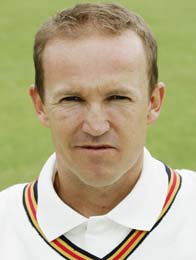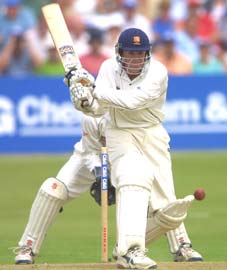For almost a decade, Zimbabwe cricket was synonymous with Andy Flower. A useful wicketkeeper-batsman who bloomed into one of the best batsmen of his generation, Flower lived the journey of Zimbabwe cricket from cradle to grave.
 Though he started off as an efficient player of fast bowling, he graduated into a class batsman against spin. The real testimony of which came on the 2000 tour of India, where he plundered 540 runs in two matches, his unbeaten innings of 232 helping Zimbabwe draw the Test in Nagpur while following-on.
Though he started off as an efficient player of fast bowling, he graduated into a class batsman against spin. The real testimony of which came on the 2000 tour of India, where he plundered 540 runs in two matches, his unbeaten innings of 232 helping Zimbabwe draw the Test in Nagpur while following-on.
Flower was not just a prolific scorer (4,794 Test runs at an average of 51.54) and an able leader, but also a man of courage; a man who gave up the glory of international cricket to stand by his beliefs.
He announced his retirement from Test cricket following the 2003 World Cup after he and teammate Henry Olonga staged an open protest against the Robert Mugabe government for what they called the 'death of democracy'.
Flower, now 37, in Mumbai on a coaching tour, spoke with Cricket Correspondent Deepti Patwardhan about the problems afflicting Zimbabwe cricket and the chances England [Images], his adopted country, have on the current tour of India.
How has it been since quitting international cricket?
Life has been pretty good. It's a pity to miss international cricket because I think I can still play. But life is still good. I have moved to England and set up my home there, and I am quite happy.
I am playing for Essex now; so is my brother (Grant). So it is okay at the moment.
You gave up international cricket when you were probably in the best phase of your career. How difficult was it to give up everything you had worked towards all these years?
That was sad, but I couldn't continue working for those people. I had to go, and made some plans and also decided to make a statement as I went; so did Henry (Olonga). You move on to different things. I don't have any regrets other than it would still be nice to be playing international cricket and scoring some runs.
How long did you think about making that decision?
I had not been thinking about giving up Zimbabwe cricket for long. But we had a lot of fights with our management over the years.
Do you think you kind of started the downslide of Zimbabwe cricket with the open protests during the 2003 World Cup?
Maybe, I was the first high profile guy to go, but the mismanagement had already started and, unfortunately, they continue to make the bad decisions. They are just going one way and that's down.
I think the ZCU (Zimbabwe Cricket Union) thinks that if they expose a whole lot of youngsters to international cricket they'll come good in five years. But I am afraid it doesn't work that way. If you get pummeled all the time it's hard to progress, because lot of the post-match talks are negative. Ideally, you want a mix of experience and youth. I am not very optimistic for Zimbabwe cricket.
Was it unfair on the youngsters in the team to be told that they could not play Test cricket any more?
They are too young. They are all 20 years old and to be playing international cricket with everyone that age is pretty much impossible. You need some experienced players there as well while you integrate these young people.
If they (players) thought they could go out and play Test cricket, that's good positive thinking; but it's unrealistic. It is not going to happen. They have very little control over their cricket unfortunately.
I think there has been total mismanagement of --- well, the country first; then there is the mismanagement of the Cricket Union and the result is that cricket is in a dire state.
They (the ZCU) had to (withdraw the Test status) or the ICC [Images] would have suspended them. So they fell on their own sword.
Zimbabwe cricket fell apart due to the constant clashes between the Union and the players. We've seen some of that in West Indies [Images] cricket as well. So how big a role does the management play in the game nowadays?
It's vitally important. The management has the experience of dealing with individuals and it is the skill of the management team that will ensure good communication.
Yes, of course, players are often greedy and stubborn, and shortsighted and all those sort of things. Part of the job of the management is to deal with those sort of employees, if you like, and get the best out of them. It is their job to maintain open communication.
Some of the better cricket administration structures are producing better teams.
As a player, how did you cope with the dual responsibility of keeping wickets and being the best batsman in the side?
Obviously it takes energy to keep as well. But the great advantage is that you are standing behind and watching the ball all the time. So you are very used to the flight path of the ball, the bounce etc. That always helped my batting.
The other thing was that I was keeping wickets when great players were batting at the same time. I could watch Sachin (Tendulkar) in my early days I liked watching (Sanjay) Manjrekar, people like that from behind. That helped my batting a lot, trying to copy and emulate that sort of players.
 And the famous reverse sweep, how did that come about?
And the famous reverse sweep, how did that come about?
It has become much more common now. That I just worked on. Dave Houghton used to play it a bit and I used to play it in league cricket to experiment what it is like. And then on some of these fast outfields it seemed to have worked very well, so I kept on with it.
You have played some good cricket in India. How did you personally counter the tough conditions?
I tried to stay as fit as possible, firstly. And then, I think, you must not make too big a deal out of it. You look after yourself and eat and drink properly. You're going to get hot and tired and thirsty, but you must not panic about it. If you make a big deal out of it you're going to struggle.
There are some technical changes you make. Obviously, as far as wicketkeeping is concerned, you have to stand closer to the stumps and stay low. While batting, you have to quickly learn to read the length of the spinners.
How do you see England doing in this series?
They will have to work very hard on how to play spin. They have struggled at certain times in Pakistan, but they might have taken good lessons from that.
They have quite a good variety of cricketers. They have some good string hitters that might take on the Indian spinners. And the smaller guys, like (Andrew) Strauss and (Ian) Bell, will play more like me.
Will their loss in Pakistan late last year weigh on their mind?
It might be at the back of their minds, actually. They wouldn't be feeling totally confident because of that. But I think (England coach Duncan) Fletcher and (England skipper Michael) Vaughan are two very good, solid leaders and it looks like they are very respected by their players. Even if they have strong lingering doubts from the series in Pakistan they are very focused on the Indian tour now.
 Though he started off as an efficient player of fast bowling, he graduated into a class batsman against spin. The real testimony of which came on the 2000 tour of India, where he plundered 540 runs in two matches, his unbeaten innings of 232 helping Zimbabwe draw the Test in Nagpur while following-on.
Though he started off as an efficient player of fast bowling, he graduated into a class batsman against spin. The real testimony of which came on the 2000 tour of India, where he plundered 540 runs in two matches, his unbeaten innings of 232 helping Zimbabwe draw the Test in Nagpur while following-on. And the famous reverse sweep, how did that come about?
And the famous reverse sweep, how did that come about?